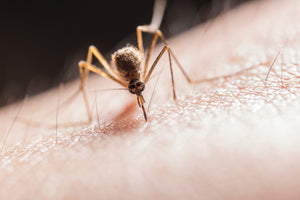What diseases do mosquitoes transmit?
Diseases transmitted by mosquitoes can be very deadly for an individual. Mosquitoes are considered the deadliest animal in the world. It may seem impossible that something so small can kill so many people, but it is true. According to the World Health Organisation, more than one million people die every year from mosquito bites.
People think of mosquitoes as annoying insects whose bites cause itching, swelling on the skin and unpleasant sensations. However, it is a short-term nuisance that we generally do not pay much attention to. A mosquito bite may not be as innocent as it seems at first sight. It can cause very harmful illnesses and, in the most severe cases, even death without proper treatment. A more detailed description of some of the diseases transmitted by mosquitoes follows below.

Malaria
Malaria is a potentially fatal tropical disease caused by a parasite known as Plasmodium. It is spread through the bite of an infected female mosquito. An infected person may have chills, flu-like symptoms, fatigue, diarrhoea or a range of other symptoms. Malaria should always be suspected if these symptoms occur within the first year after returning from an infected area. It is one of the world's leading causes of illness and death. It is estimated that around 200 million new cases occur each year, of which more than 500,000 result in death (91% in Africa).

Zika
Zika virus is a flavivirus that is transmitted through the bite of the Aedes mosquito. The same species of mosquito also transmits other infectious diseases such as dengue and chikungunya. Anyone travelling or living in areas where mosquitoes are infected with Zika virus can become infected. These areas include South and Central America, South-East Asia, Africa and islands in the Pacific (e.g. French Polynesia). In Europe, the spread of Zika virus via infected mosquitoes has not yet been confirmed. Infection is often completely asymptomatic - although the virus is contracted, symptoms such as fever, malaise and malaise do not appear. A person who has had a symptomless Zika virus infection will still have specific antibodies in the blood, which can be confirmed by microbiological tests. A certain proportion (about 20%) develop symptoms and signs of Zika virus infection. The course of the disease is mild for most, with health problems usually disappearing within a few days or at most after a week. There are few reports of deaths due to Zika virus infection, and most of the patients who died had co-morbidities and/or immune system disorders.

West Nile Virus (WNV)
Most people who are infected show no signs of illness or have flu-like symptoms such as fever, headache, muscle aches and tiredness. In some cases, the illness can be severe, including central nervous system involvement. Most cases of clinically detected infection occur from mid-July to the end of September. The occurrence of the disease depends on a number of factors, such as the presence and activity of vectors (mosquitoes) and the natural reservoir of the virus (birds). In Slovenia, natural conditions allow the existence of a vector and, together with data from neighbouring countries, suggest the possibility of the occurrence of WNV also in Slovenia. The time from infection to disease onset is usually 3 to 14 days after infection. WNV is usually transmitted to humans by the sting of an infected mosquito (Culex mosquito). The vectors (mosquitoes) become infected by sucking the blood of infected birds, which are the natural reservoir of the disease. Contact with birds does not pose a risk of transmission.Other modes of transmission are rare and include human-to-human transmission through transfusion of blood and components and donated organs, which is possible but extremely rare. Mother-to-unborn child transmission and transmission via breast milk are possible.
Ensure complete protection and safety from mosquito bites with our natural products.

